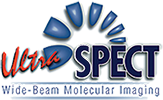Technologists Can Meet ASNC Low Dose Guidelines Using Existing Imaging Protocols with UltraSPECT Image Reconstruction Software
Auburndale, Mass., September 25, 2013 – UltraSPECT, a leading provider of image reconstruction technology that reduces radiopharmaceutical dose and acquisition time for nuclear medicine (NM) exams, announces today that study data has shown UltraSPECT solutions are a viable method for meeting American Society of Nuclear Cardiology (ASNC) low dose guidelines. Furthermore, technologists are able to rely on their existing imaging protocols, providing added confidence in overall results. UltraSPECT will be demonstrating this solution to conference attendees at the upcoming ASNC Annual Meeting, September 26-29, in Chicago.
“What this preliminary data shows us is that healthcare facilities do not have to change their standard imaging protocols to meet ASNC guidelines to lower dose,” explained Gordon DePuey, MD, director of Nuclear Medicine at St. Luke’s-Roosevelt Hospital, New York. “I am looking forward to seeing the great progress that the cardiovascular imaging community can make in 2014 as proven and viable solutions are applied to lower the dose for the benefit of patients and to continue to advance healthcare.”
Researchers gathered the study data from 257 patients using a full-dose protocol, and 205 patients using a half-dose protocol. The half-dose protocol was achieved using the Wide Beam Reconstruction (WBR™) algorithm-based Xpress.Cardiac™ software from UltraSPECT, which maintains SPECT image quality despite lower image counting statistics. Evaluation of the results showed an impressively high number, 77% of studies performed with the half dose protocol were below 9mSv. In stark contrast, none of the studies done with the full-dose protocol were below 9mSv.
ASNC low-dose guidelines, set to take effect on January 1, 2014, recommend that the cardiology community limit the total radiation exposure to patients undergoing SPECT/PET myocardial perfusion imaging (MPI) tests to an average of less than or equal to 9 mSv (millisieverts) in 50% of studies. These guidelines, and effective methods for achieving them, are set to be topics of discussion during the ASNC Annual Meeting.
"We support the American Society of Nuclear Cardiology low-dose guidelines, and are proud to be able to help the cardiovascular imaging community and patients by providing cost-effective solutions that are proven to easily and effectively lower dose,” said Yossi Srour, president and CEO, UltraSPECT. “Our goal at UltraSPECT is to continue to provide imaging innovations so that healthcare organizations have smart and cost-effective solutions to make lowering the dose and meeting industry guidelines as easy and seamless as possible.”
The cost-effective UltraSPECT WBR software is available, through a variety of financing options, direct from the company as well as through their agreement with radiopharmaceutical provider PharmaLogic, under which PharmaLogic is offering the WBR software as part of its patient-centered approach.
For more information visit www.ultraspect.com or call 1-888-WBR-SCAN (1-888-927-7226).
About UltraSPECT:
UltraSPECT Inc. is a leading provider of image reconstruction products, dedicated to enhancing the performance of existing nuclear medicine gamma cameras and PET scanners. Based on proprietary, innovative reconstruction algorithms, UltraSPECT’s Wide-Beam Reconstruction (WBR™) solutions shorten acquisition times, lower radiation dose and increases image resolution. Xpress.Cardiac™ enables rest/stress study acquisition with either half the radiopharmaceutical dose or half the scan time, compared to conventional acquisition techniques. Xpress3.Cardiac™ offers simultaneous reduced-dose and reduced-time imaging, supporting increased patient safety and comfort.
# # #
Media Contact:
Sourav Das
KNB Communications for UltraSPECT
Office: 203-504-8230 x131
Mobile: 203-448-8843
[email protected]
